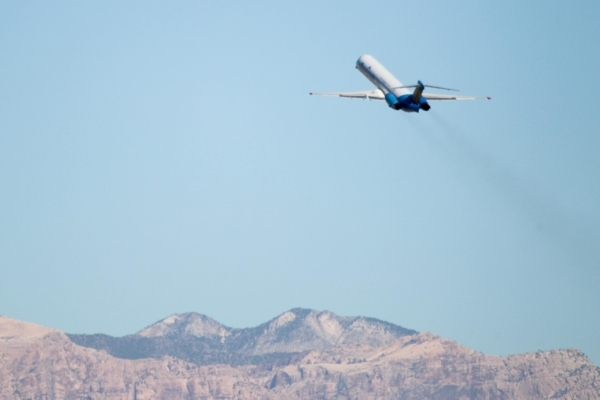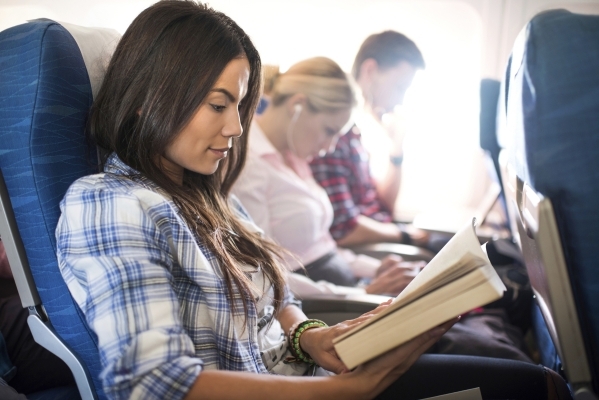Tips to help anxious flyers cope with their fears
Funny thing about the Christmas holiday season: For many travelers, it's the only time each year when the joys of visiting family members or escaping on a holiday vacation are strong enough to outweigh the fears of getting onto a plane and actually flying.
But taking that annual holiday flight doesn't have to be a white-knuckle experience. In fact, even if fearful flyers may never come to actually enjoy air travel, understanding what lies behind the anxiety they feel can help at least to dial back a bout of in-flight anxiety.
Anxiety "is part of normal human experience," notes Noelle Lefforge, assistant professor in residence in the University of Nevada, Las Vegas psychology department and assistant director of The PRACTICE, UNLV's community health clinic.
That said, anxiety also is a tricky-to-manage part of human experience. Lefforge says, for example, that anxiety can grow out of our overestimating danger and that "once we see something isn't the danger that we imagined it to be, we'll become less afraid of the behavior. So, the best way to treat anxious (behavior) is to expose ourselves to the things that scare us."
The problem is that anxiety also "prompts us to avoid what we're anxious of," Lefforge says, and that can rob us of the chance to learn to tolerate our anxieties and realize that the anxiety we feel will pass.
Anxiety "often occurs when one of two things happens: One, we overestimate the danger and, two, we underestimate our sense of control or feel out of control," Lefforge says. "And, if you think about it, flying is primed for both of those things to happen."
We overestimate the dangers of flying by not realizing that "the only flights we hear about are worst-case scenarios," Lefforge says. "The only time you see flying on the news is when planes crash. You don't get the story of millions of other people every year who make flights completely safely."
But, at the same time, it's true that "we passengers ... don't have much control over how that flight's going to go," Lefforge says.
Then add to all of this the practical and financial obstacles of, say, taking a flight somewhere every weekend so that we can become accustomed to flying, and it's not surprising that anxiety about flying is so common. According to Lefforge, it's estimated that "30 to 50 percent of people have some sort of fear of flying at some point in their lives."
So, first, "practice some self-compassion," Lefforge says. "Understand that this is really common."
But, at the same time, she continues, "it may be worthwhile to step back and challenge some of the beliefs you have that flying is unsafe."
Search out statistics on the Internet and you'll discover that air travel is "actually incredibly safe," Lefforge says. "The chance of passengers dying on any given flight with one of the world's major airlines is one in 4.7 million."
Once onboard, use grounding techniques to help yourself remain calm. "The idea is to shift activity in the brain away from the emotional centers toward our thinking centers," Lefforge says, by engaging in tasks that are "somewhat demanding but not too demanding.
"Things I'd be thinking about are puzzle books, like sudoku, which are available in most airports. Another technique is called '54321.' Have someone go through five things they can see, four things they can hear, three things they can touch and two things they can smell, and then take one slow deep breath."
Employ deep breathing exercises to calm yourself. "Nowadays, it's easy to find some great guided deep breathing exercises either online or through apps," Lefforge says. "They're usually free to download and you can load them on your phone and listen to them, but make sure it still works when the phone's in airplane mode if you're going that route."
If you feel anxious en route, remind yourself "why you're traveling, how the uncomfortable activity corresponds to doing something you really do value, something that you're going to make meaning of," Lefforge says. "So focus less on 'I'm scared right now' and more on 'I'm really uncomfortable now, but it's because I really want to see my family' or whatever the case may be."
Those who suffer severe anxiety may wish to explore "medication options" with their health care providers, Lefforge says.
However, she adds, medications "do relieve anxiety in the short term but don't do much for the problem in the long run and can actually make it worse. They kind of teach us to avoid experiencing anxiety. If people can really work on learning to tolerate anxiety and accept it as part of their experience and seeing that it does pass on its own, that can be really empowering and help us in most areas of our life, not just flying."
"For most people, fear of flying is mostly an inconvenience. They're still able to get on the plane when they want or need to," Lefforge says. "There are other people where the anxiety from flying is so intense that they basically become incapacitated by it and wouldn't fly even if they really wanted or needed to."
For others, anxiety about flying may be "kind of the tip of the iceberg, and they actually avoid all kinds of things because they are so plagued by anxiety," Lefforge says.
"People in either of these two groups might want consider seeking out therapy. Anxiety is a highly treatable condition for a large segment of the population. Anxiety is a normal part of the human experience. It's how much does it affect your life and functionality that is a gauge of when it's a problem that you might want to get therapy for."
— Contact reporter John Przybys at jprzybys@reviewjournal.com or 702-383-0280 or follow @JJPrzybys on Twitter.























